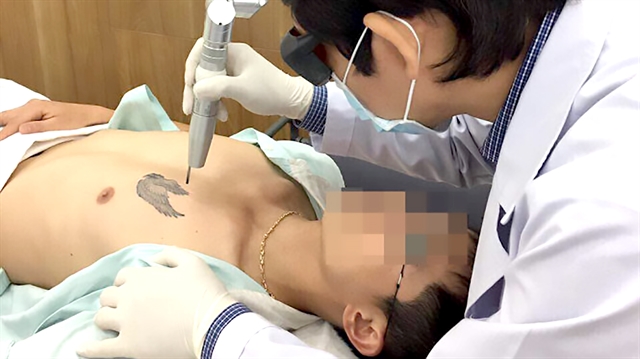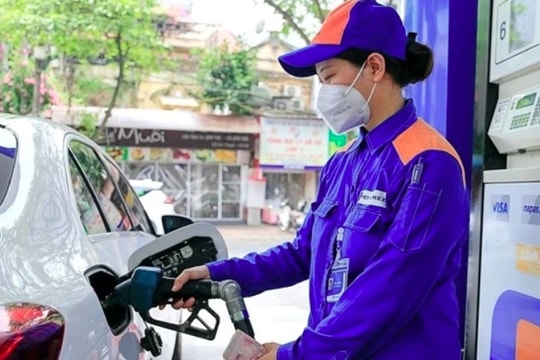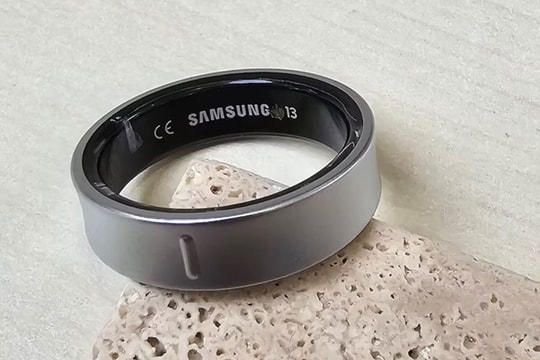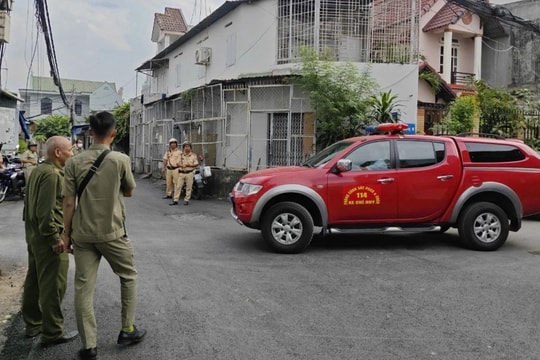 |
| A doctor removes a tattoo for a patient at the Dermatology Hospital of HCM City. Photo tuoitre.vn |
HCM CITY — The Dermatology Hospital of HCM City has recently received many cases of tattoo-related complications.
N.D.P., 35, living in the city, had a tattoo on his thigh over two years ago and for years there was nothing wrong.
However, recently, the tattooed skin, especially in areas with red ink, began to itch, sting and develop scaly patches.
Then he visited local medical facilities and was prescribed anti-inflammatory ointments, but his condition only partially improved.
The scaly patches continued to worsen, leading him to seek treatment at the hospital.
In a similar case, P.T.L., 28, had a stable tattoo for three years until she began taking the antiviral medication Tenofovir a month ago.
Her tattoos then started to exhibit inflammatory reactions with scaling, which responded poorly to all topical treatments.
After going to the hospital for an examination, she was diagnosed with granulomatous reactions following tattooing.
According to doctors, the condition could appear years after getting a tattoo, sometimes without a specific cause or after exposure to factors that trigger inflammatory responses, such as certain medications of Antiretroviral therapy (ART), Tenofovir or excessive sunlight.
Treating the cases can be challenging and often requires a combination of approaches, including triamcinolone injections at the site of the reaction, surgical removal of the affected tattooed area or using lasers to eliminate the tattoo ink.
Causes
Hoàng Văn Minh, director of the Centre for Skin Diseases and Congenital Nevi, talked to Tuổi trẻ (Youth) online newspaper about tattoos and how they are essentially permanent marks on the skin using ink.
Typically, tattoo artists use a hand-held machine that functions like a sewing machine, with needles repeatedly puncturing the skin.
With each puncture, a tiny drop of ink was deposited into the outer layer of the skin.
Despite advancements in tattoo technology, complications remained common.
Phan Ngọc Huy, a doctor from the Dermatology Hospital of HCM City said that tattooing was becoming increasingly popular, yet the quality of tattooing facilities and the source of inks were not always well-regulated.
Consequently, the number of tattoo complications had been rising in recent years.
It could be due to factors such as non-sterile tattooing practices, incorrect application of ink layers, unverified ink sources, a higher risk of bacterial infections, allergies and the complexity of the tattoo, which requires larger amounts of ink and multiple colours.
Complications
Huy said common complications from tattoos included infections, allergies, keloid (skin growth) scarring and blood-borne diseases.
Specifically, infections were a frequent issue post-tattooing.
Studies indicated a high rate of bacterial contamination in tattoo ink, approximately 10 per cent, with Gram-negative bacteria like Pseudomonas and Acinetobacter.
Allergic reactions were often seen in patients with multi-coloured tattoos, cosmetic tattoos on their lips or eyebrows and tattoos which used red or yellow ink.
Symptoms typically included itchy, red rashes, skin peeling and persistent or recurrent flare-ups, in spite of treatment.
Keloid scarring was common among individuals with a predisposition to keloids or those who did not follow proper aftercare.
Improperly sterilised tattoo equipment could also pose risks of transmitting blood-borne diseases such as HIV, Hepatitis B and Hepatitis C.
Minh said tattoos could obscure signs of skin cancer or other skin conditions like moles or red patches that might otherwise go unnoticed.
A previous study on adults in Denmark found traces of nickel, lead and other carcinogens in 65 types of tattoo ink.
According to a June 2024 study published in The Lancet, research in Sweden involving 11,905 participants found a correlation between tattoos and an increased risk of malignant lymphoma.
What to consider
Doctors recommend thoroughly understanding potential risks, such as infections, allergies, keloid scarring and blood-borne diseases before deciding to get a tattoo.
People should choose a reputable tattoo studio which is crucial for ensuring safety and quality.
People are advised to select a licensed studio with skilled artists who use properly sterilised equipment and high-quality inks.
Those considering a tattoo should reflect carefully and be clear about their commitment to the tattoo.
Many people get tattoos on impulse or due to trends, they then regret and seek removal, which can be time-consuming and costly.
Anyone with existing health issues, such as allergies, dermatological conditions or cardiovascular concerns, should consult a doctor before getting a tattoo.— VNS
























